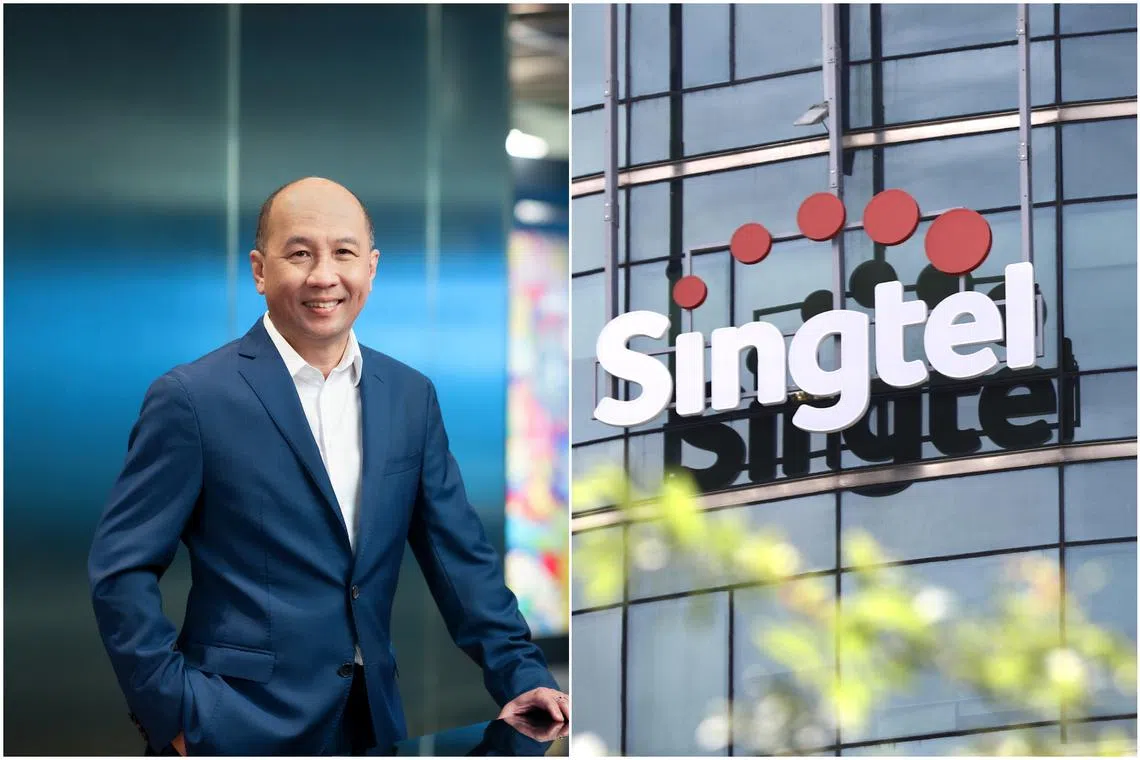Singtel CEO’s pay rises over 16% in FY2025 to $8.2 million on the back of increased profits
Sign up now: Get ST's newsletters delivered to your inbox

Singtel CEO Yuen Kuan Moon’s remuneration for the 2025 financial year saw an increase of more than 16 per cent from his pay of $7 million in the year before.
PHOTOS: SINGTEL, ST FILE
Follow topic:
SINGAPORE – Singtel chief executive officer Yuen Kuan Moon received a total remuneration of $8.2 million for the 2025 financial year ended March 31, an increase of more than 16 per cent from his pay of $7 million in the 2024 financial year.
This was a result of the group’s strong performance over FY2025, said the telco’s annual report out on June 30.
Singtel saw its net profit jump more than 400 per cent to $4.02 billion, up from $795 million a year ago. This was boosted by a one-time exceptional gain of $1.3 billion from the partial divestment of the group’s Comcentre headquarters.
Singtel had partnered Lendlease to redevelop the property, a project that was announced in 2022.
Underlying net profit increased by 9 per cent to $2.47 billion, underpinned by growth in the group’s businesses and regional associates.
Singtel said it will pay a total ordinary dividend of 17 cents for FY2025, a 13 per cent increase over the 15 cents the year before.
This marks a strong start to the Singtel28 plan, Singtel said. The plan, led by Mr Yuen in 2024, is designed to lift business performance and capitalise on growth trends to deliver sustained value for shareholders.
Mr Yuen’s remuneration consisted of $1.3 million in salary, $77,808 in benefits and a cash bonus of $2.2 million.
He also received a restricted share award of $2.2 million and performance share award of $2.4 million.
Singtel said in the report: “Mr Yuen has been instrumental in leading one of Singtel’s most ambitious transformations to reposition the group for growth amid accelerated digitalisation and disruption in the telecommunications industry.
“The strategic reset he introduced at the start of his tenure has altered the fundamental make-up of the group – redefining it along the lines of connectivity, digital services and digital infrastructure.”
Mr Yuen was appointed group CEO in 2021. He had run Singtel’s consumer business in Singapore as CEO since 2012.
Singtel added that under Mr Yuen, the consumer and enterprise businesses in Singapore and Australia were integrated. The digital services under NCS were also expanded and a new regional data centre business called Nxera was created.
“Under his watch, Singtel established 5G market leadership which serves to underpin the growth of the group’s existing and new businesses across Singapore and the region,” it said.
In a joint address in the report, Mr Yuen and Singtel chairman Lee Theng Kiat said that Singtel is embarking on a three-year value realisation share buyback programme of up to $2 billion until FY2028 to return excess capital to shareholders.
They added that Singtel’s priority is to maintain growth momentum across its businesses, amid global uncertainty.
“The volatility in US tariff policy has resulted in unusual financial market fluctuations and an unpredictable economic narrative,” they said.
“As we are in the services sector, tariff threats, as they now stand, have limited impact on our business, although the trade conflict could see slower economic growth and softer consumer and business sentiment.”
They added that Singtel has to stay adaptable and know when to shift course as business sentiment softens.
Singtel is also staying its course with its sustainability goals, despite pullback in other countries, such as US President Donald Trump withdrawing the US from the Paris climate deal in January.
Mr Yuen and Mr Lee said: “Although politics has cast a shadow over sustainability in some parts of the world, we remain committed to sustainability and advancing the climate change targets we have set ourselves.”
Singtel has reduced its Scope 1 and 2 carbon emissions by 14 per cent in the past year.
Scope 1 emissions refer to direct emissions incurred by a company, say, from its facilities or transport vehicles, while Scope 2 refers to indirect emissions such as the electricity or heating it buys from power-generation companies.
The two Singtel chiefs said: “We recognise that achieving our net-zero goal by 2045 requires collective action across the value chain and have been proactively collaborating with various organisations to keep moving the needle on this front.”
To help track its Scope 3 emissions, Singtel also worked with the Singapore Business Federation and other partners to develop Singapore’s first Emissions Factors Registry.
The registry provides a centralised platform for industry-specific emissions data, which will enable businesses to measure and report their carbon footprint with greater accuracy.
Scope 3 emissions refer to indirect greenhouse gas emissions incurred by a company as part of its value chain, such as business travel by employees, the use of its sold products or the emissions from its purchased goods and services.
Singtel also launched a responsible procurement policy and is supporting trade association SGTech with its work in helping small and medium-sized enterprises with their carbon management and reporting.
Singtel shares closed 0.5 per cent lower at $3.82 on June 30.
Sue-Ann Tan is a business correspondent at The Straits Times covering capital markets and sustainable finance.


